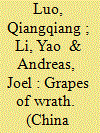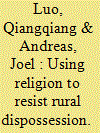| Srl | Item |
| 1 |
ID:
151714


|
|
|
|
|
| Summary/Abstract |
In recent years the Chinese Communist Party has moved to scale up, modernize, and commercialize agriculture by placing it under the direction of large commercial enterprises known as dragonheads. Although scholars have drawn attention to the rapid advance of capitalist-style farming in China, there has been little investigation into how villagers have been pressed to cooperate with this endeavor. In this article, we examine methods used by local officials to create a grape production base for a large wine company in Xinjiang, which entailed getting all the peasant households in several townships—many of which were strongly opposed—to shift from cultivating rice and raising fish to growing grapes on contract. In this aggressive campaign, Party cadres and influential citizens were mobilized to persuade and coerce villagers, using an array of incentives and disincentives, to join what ultimately proved to be a very risky venture.
|
|
|
|
|
|
|
|
|
|
|
|
|
|
|
|
| 2 |
ID:
146518


|
|
|
|
|
| Summary/Abstract |
In this paper, we examine the role played by religion in a struggle waged by Hui Muslim villagers against land expropriation. Religion can provide powerful resources for protest movements, especially for religious minorities, but it can also be dangerous. This is particularly true in China where the state has had little toleration of autonomous organization and has long been suspicious of religious organization, especially among ethnic minorities. Scholarly literature about collective action by religious minorities in China has focused on protests about cultural and political issues – and the repression of such protests – but there has been relatively little scholarship about protests by religious minorities over economic issues. The number of protests over economic conflicts has increased in recent years, and the state has been more tolerant of economic than of political protests. These conditions have shaped the following questions: what happens when villagers employ religious ideas and use religious organization to advance economic demands? How effective are religious ideas and organization as tools of mobilization? How do government authorities respond?
|
|
|
|
|
|
|
|
|
|
|
|
|
|
|
|